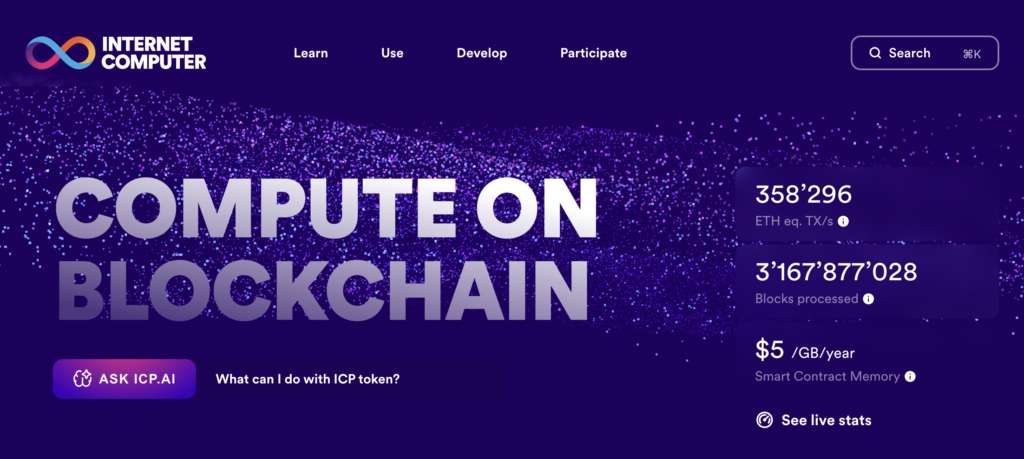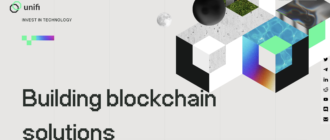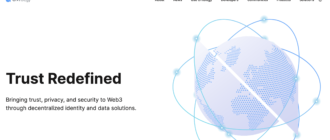Internet Computer represents an ambitious blockchain project developed by DFINITY Foundation, aimed at revolutionizing the internet by enabling a decentralized web. The project aspires to extend the functionality of the public internet so that it can host backend software, transforming the internet into a global computing platform.

Project History
The Internet Computer project was conceived by Dominic Williams and was developed under the DFINITY Foundation, which started in 2016. The project quickly gained attention for its revolutionary ideas and potential to disrupt traditional internet structures. It raised significant funding through venture capital and community contributions, including a notable $102 million from investors like Andreessen Horowitz and Polychain Capital in 2018. The network officially launched its mainnet in May 2021, introducing the world to a novel form of blockchain technology designed to run at web speed and scale.
What is Internet Computer?
Internet Computer is a public blockchain and protocol that aims to host the world’s next generation of software and services. The core mission is to support data-rich and computation-intensive applications at internet speeds, directly into the fabric of the web, without the need for traditional services like cloud hosting. This platform enables developers to deploy smart contracts and decentralized applications (dApps) directly on the blockchain, which can operate at phenomenal speeds, reduce costs, and enhance content delivery.
How the Internet Computer Project Works?
Internet Computer distinguishes itself through its advanced and unique technological stack, designed to reshape how blockchain functionalities integrate with internet-level operations. Here’s a deeper look at the key technologies that form the backbone of the project:
Blockchain Structure
At its core, Internet Computer’s blockchain is structured to expand beyond traditional smart contracts and decentralized applications. It uses a novel protocol structure that consists of independent data centers worldwide contributing computing power to form a decentralized environment. This blockchain is not a single chain but a network of chains that operate in parallel, allowing for unprecedented scalability and speed. Each chain can handle specific applications or smart contracts, enabling high throughput due to parallel processing.
Consensus Mechanism
Internet Computer utilizes a unique consensus algorithm known as “Threshold Relay Consensus”. This consensus is a blend of randomness and speed, providing security and efficiency. It operates using a randomized beacon to generate a random value that selects the group of nodes responsible for the next block’s proposal. This method ensures a high level of security as the selection process is unpredictable, thereby minimizing the risks of attacks or manipulations.
The consensus protocol is further enhanced through “Notarization” processes, where a group of randomly chosen nodes confirms blocks proposed by the beacon-selected proposer. This layer adds an additional verification step, ensuring that all operations on the blockchain are double-checked for accuracy and legitimacy.
Chain Key Technology
One of the standout innovations in the Internet Computer project is the Chain Key Technology. This technology comprises a set of cryptographic protocols that manage the network’s public key infrastructure. With this setup, only a single public key is necessary for client interactions, drastically simplifying user experience while maintaining robust security. It allows for functions such as updating the protocol or adding new nodes to be more dynamic and secure, which are essential for the blockchain’s ability to scale and evolve.
Differentiation from Other Projects
Unlike traditional blockchains that operate as monolithic structures, Internet Computer’s architecture allows it to function more like a complete IT stack built directly into the fabric of the internet. This eliminates the need for third-party services like cloud hosting, offering developers a direct way to deploy code onto the public internet. Additionally, its consensus mechanism uniquely balances speed with randomness, providing an innovative approach to securing network operations and scalability.
Tokenomics of the Internet Computer Project
ICP: Token or Coin?
The native digital asset of the Internet Computer ecosystem is ICP, which technically functions as a utility token. Unlike a coin, which typically operates as a standalone unit of currency within its blockchain, a token like ICP serves specific use cases within its ecosystem. In the case of ICP, these uses include governance, rewarding network participants, and facilitating computational operations.
Emission Model and Token Supply
ICP’s emission model is designed to align with the network’s operational needs and governance structure. The total supply of ICP was finite at its launch, with a significant portion distributed to early contributors and investors through initial seed rounds and community airdrops. As the network evolves, the emission of new tokens is regulated by the Network Nervous System (NNS), Internet Computer’s decentralized governance mechanism. This system decides on key parameters like token inflation or deflation based on network needs, aiming to balance token supply with demand.
Token Distribution and Utility
ICP tokens have several key utilities within the Internet Computer ecosystem:
- Governance: Token holders can lock their ICP to create neurons in the NNS, participating in governance decisions by voting on proposals that influence the network’s future.
- Rewards: The NNS also distributes ICP tokens as rewards to network participants, including node providers and developers, incentivizing their continuous support and development of the platform.
- Transaction Fees: ICP tokens are used to pay for transaction fees within the network, akin to gas fees on networks like Ethereum. This usage ensures that developers and users contribute to the operational costs of the network in proportion to their usage.
Price Dynamics
The price of ICP, like most cryptocurrencies, is subject to market conditions and investor sentiment. Since its launch, ICP’s price has experienced significant volatility, reflecting the broader trends in the crypto market as well as the project’s specific developments and updates. The market prices ICP based on its perceived value as a utility token within the Internet Computer ecosystem, considering factors like network adoption, technological advancements, and the overall growth of the decentralized web that it aims to foster.
Economic Stability and Future Prospects
The economic stability of ICP is tightly coupled with the adoption and functional expansion of the Internet Computer. As the platform aims to host more dApps and integrate with other blockchain ecosystems, the demand for ICP could increase, influencing both its utility and price. The governance system (NNS) plays a critical role in this by adjusting tokenomics dynamically to meet the changing needs of the network, ensuring a balanced and sustainable economic model.
By focusing on a detailed and dynamic approach to tokenomics, Internet Computer aims to create a robust economic environment that supports its ambitious goals of reshaping the internet.
Where to Buy the ICP Token?
ICP tokens are available for purchase on several leading cryptocurrency exchanges, which cater to a wide range of users across the globe. Here’s a list of platforms where you can buy ICP:
- Binance: As one of the largest and most popular cryptocurrency exchanges globally, Binance offers extensive trading pairs for ICP, including against major cryptocurrencies like Bitcoin (BTC) and Ethereum (ETH), as well as fiat currencies.
- HTX (formerly Huobi): Known for its robust platform and a wide selection of cryptocurrencies, HTX provides users with the ability to trade ICP in several key markets.
- MEXC: This exchange is favored for its user-friendly interface and a diverse range of trading options. MEXC supports ICP trading and often includes it in trading competitions and incentives.
- Bybit: Known for derivatives and spot trading, Bybit also offers ICP trading. It is recognized for its intuitive design and strong liquidity.
- KuCoin: Popular among traders for its wide selection of cryptocurrencies beyond the major ones, KuCoin offers ICP trading with good liquidity and multiple pair options.
- Bitfinex: As one of the oldest cryptocurrency exchanges, Bitfinex provides advanced trading features and high liquidity for trading ICP, especially suitable for more seasoned traders.
Each of these exchanges provides different interfaces, fee structures, and trading options, catering to a variety of user preferences and strategies.
Where to Store the ICP Token?
When it comes to storing ICP tokens, users have several options ranging from exchange wallets for convenience to more secure hardware wallets for enhanced security. Here are some recommended storage solutions:
- Exchange Wallets: For those who trade frequently, storing ICP on the exchange where it was purchased can be convenient. Exchanges like Binance and KuCoin offer integrated wallets. However, it’s crucial to be aware of the security risks associated with keeping tokens on an exchange.
- Software Wallets: These wallets are apps or software installed on a device. Examples include NNS Frontend Dapp, a wallet designed specifically for interacting with the Internet Computer’s Network Nervous System, and Plug, a browser-based wallet tailored for DeFi and everyday use on the Internet Computer network.
- Hardware Wallets: For optimal security, hardware wallets like Ledger Nano S and Ledger Nano X provide offline storage, safeguarding your tokens from online threats. These devices support ICP and are renowned for their security features, allowing users to manage their tokens with peace of mind.
- Mobile Wallets: Mobile options such as the Stoic Wallet, which is specifically tailored for the Internet Computer, offer convenience and ease of use. These wallets are designed for on-the-go access from your smartphone, providing both security and accessibility.
Choosing the right storage option for your ICP tokens involves balancing convenience and security. For large amounts or long-term storage, hardware wallets are advisable, whereas, for regular trading and accessibility, exchange or software wallets might be more practical. Always ensure to use wallets that offer strong security measures to protect your digital assets.
Future Outlook and Development Forecast
Foundations for Growth
The growth of the Internet Computer project is grounded in its innovative approach to redefining how blockchain technology integrates with internet infrastructure. The project’s ability to directly host software and services on the internet paves the way for revolutionary applications in sectors such as decentralized finance, enterprise IT, and content delivery. Its unique technology stack, including Chain Key Technology and Threshold Relay Consensus, positions it as a leading player in the pursuit of a fully decentralized internet.
Clients and Partners
Internet Computer has attracted a diverse range of clients and partners, from individual developers and start-ups to large enterprises interested in leveraging decentralized technologies for enhanced security and efficiency. Key collaborations include:
- LinkedUp: An open version of LinkedIn, showcasing the potential for social media applications on the Internet Computer.
- CanCan: A decentralized TikTok-like video sharing platform that demonstrates the network’s capability to handle high-throughput content distribution.
- Fleek: Provides hosting and development tools for building on the decentralized web, including the Internet Computer.
- Distrikt: A decentralized, community-governed professional network, built entirely on the Internet Computer, emphasizing privacy and user control.
These partnerships and projects not only validate the technology but also serve as critical real-world implementations that drive further adoption and development.
Development Forecast
Looking ahead, the Internet Computer is set to expand its ecosystem through increased integrations with other blockchains, fostering interoperability in the crypto space. The focus will also be on enhancing scalability and user experience to accommodate a growing number of enterprise-level applications. As regulatory landscapes evolve, Internet Computer may also play a pivotal role in shaping how decentralized internet services comply with global standards and laws, potentially leading to increased institutional adoption.
The Project Ecosystem
The ecosystem surrounding the Internet Computer is robust, consisting of various tools, platforms, and community projects that enhance the network’s functionality and accessibility:
- Dapps: Ranging from social media platforms and independent content creators to complex enterprise applications, the variety of Dapps on the Internet Computer continues to grow.
- Developer Tools: The Internet Computer provides developers with powerful tools such as Motoko (a programming language tailored for the Internet Computer), DFX (a command-line tool for managing Internet Computer projects), and the Internet Identity framework for secure, anonymous authentication.
- Community Initiatives: A vibrant community of developers, enthusiasts, and innovators contribute to the ecosystem through educational content, open-source projects, and community-driven governance activities.
The proactive development of these aspects of the Internet Computer’s ecosystem is central to its future growth and sustainability, enabling it to adapt to the needs of a wide range of users and use cases. As the platform matures, its ecosystem is expected to become a major hub for innovation in decentralized applications and beyond.
Conclusion
The Internet Computer project is a bold step towards a decentralized and more accessible internet, offering a scalable and efficient blockchain solution. Its innovative approach to smart contract deployment, consensus mechanisms, and governance sets it apart in the blockchain space. For advanced users and investors, understanding the underlying technology and strategic potential of such projects is essential for informed decision-making in the dynamic cryptocurrency landscape. As the project continues to evolve, its contributions to the broader blockchain community and potential impact on the internet remain areas of significant interest and anticipation.






